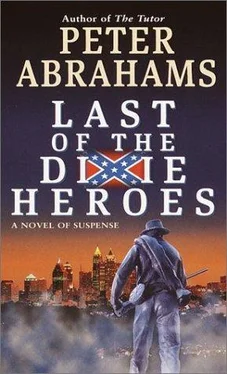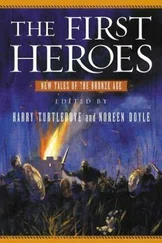Peter Abrahams - Last of the Dixie Heroes
Здесь есть возможность читать онлайн «Peter Abrahams - Last of the Dixie Heroes» весь текст электронной книги совершенно бесплатно (целиком полную версию без сокращений). В некоторых случаях можно слушать аудио, скачать через торрент в формате fb2 и присутствует краткое содержание. Жанр: Триллер, на английском языке. Описание произведения, (предисловие) а так же отзывы посетителей доступны на портале библиотеки ЛибКат.
- Название:Last of the Dixie Heroes
- Автор:
- Жанр:
- Год:неизвестен
- ISBN:нет данных
- Рейтинг книги:4 / 5. Голосов: 1
-
Избранное:Добавить в избранное
- Отзывы:
-
Ваша оценка:
- 80
- 1
- 2
- 3
- 4
- 5
Last of the Dixie Heroes: краткое содержание, описание и аннотация
Предлагаем к чтению аннотацию, описание, краткое содержание или предисловие (зависит от того, что написал сам автор книги «Last of the Dixie Heroes»). Если вы не нашли необходимую информацию о книге — напишите в комментариях, мы постараемся отыскать её.
Last of the Dixie Heroes — читать онлайн бесплатно полную книгу (весь текст) целиком
Ниже представлен текст книги, разбитый по страницам. Система сохранения места последней прочитанной страницы, позволяет с удобством читать онлайн бесплатно книгу «Last of the Dixie Heroes», без необходимости каждый раз заново искать на чём Вы остановились. Поставьте закладку, и сможете в любой момент перейти на страницу, на которой закончили чтение.
Интервал:
Закладка:
Roy drew a blank.
“ ‘Friends in Low Places’ by Garth Brooks, Roy. We play all his stuff. Had a singer sounded just like him, swear you couldn’t tell the difference, but he quit. I sing a bit myself, tell you the truth, just my own material.”
“You write songs?”
“I’ll send you a demo. Not in the music business by any chance, are you, Roy?”
Roy explained what he did.
“Any money in it?”
“Not a lot.”
“But steady work. You got a family, I recall.”
“Yes.”
“How I know is Uncle Roy goes on and on about the name you gave that boy.”
“He does?”
“Talks about you a lot. Football. But mostly that name. What was it, again?”
“Rhett.”
“Yeah, Rhett. Truth is, he don’t like it.”
“I know.”
“Thinks it’s a fag name.”
Roy said nothing. He’d thought something along those lines at first, but Marcia had insisted: it was the boy name she’d dreamed of from the day she’d visited the Margaret Mitchell Museum on an eighth-grade trip. Now Roy’s reaction to the name, the whole feeling it gave him, had changed completely: it was Rhett’s name.
“What’s he like?” said Sonny Junior.
“A good boy.”
“He’d be my nephew.”
“Cousin, I think.”
“Like to meet him,” said Sonny Junior. “Maybe pay back some for all the things Uncle Roy’s done for me.”
“He’s done things for you?”
“Such as letting me hole-stay here, store all my shit.” He reached for the bottle.
“No more for me, thanks,” Roy said.
“Don’t drink it, then-it’s a free country,” said Sonny Junior, filling Roy’s cup anyway but dispensing with the mix this time. “Tell me about the football star thing.”
“I wasn’t a star. One year on special teams at Georgia, that was it.”
“You got cut?”
“Just about. Had a concussion or two and the doctor wouldn’t clear me to play. Ended up losing my scholarship.”
“That sucks.”
“Worked out okay,” Roy said. A wife like Marcia, a son like Rhett, a house in a neighborhood like Virginia-Highland, seventy-two seven, before bonuses: standing there in this barn, Roy knew he’d come a long way.
Sonny Junior was watching him over the rim of his paper cup. “You grew up kind of sizable, Roy.”
Roy shrugged.
“Remember how we used to rassle a little in this here barn?”
“No.”
“Long time ago, naturally. I was probably about four, you must’ve been three.”
“I don’t remember.”
Sonny Junior nodded. “Place used to creep me out too-all this shit on the walls, hasn’t changed a bit.”
Roy glanced around, saw rusting farm tools hung on nails and hooks-hoes, rakes, scythes; something else he didn’t recognize.
“Know what that is?” Sonny Junior said, picking up on it right away.
“No.”
Sonny Junior rose, lifted whatever it was off the wall with a grunt, brought it back to Roy. “Ball and chain,” he said. “Sixteen pound.” He dropped it on the floor. It made a booming sound, cracked one of the old broad planks.
Roy thought at once of Angola and some connection to Sonny Senior, and so didn’t get it. “Check this out,” said Sonny Junior, sitting on the floor at Roy’s feet, very supple for such a big man, and fitting the leg clamp around Roy’s ankle. He closed the clamp. It had a long black key in it, a key Sonny Junior turned and withdrew. “Give it a try,” he said.
Roy tried to walk. “Jesus,” he said.
“Wicked,” said Sonny Junior. “Only way is to pick the thing up and carry it.”
Roy picked up the iron ball in both hands, took a step or two, the chain clanking between his feet. “I didn’t know they still used these,” he said.
“Huh?” said Sonny Junior, surprised enough to drop the key. It bounced once or twice and disappeared under the demolition derby car. “No one still uses them, Roy. How humane would that be? This one surely goes back to the old days.”
“What old days?” Roy said, his gaze on the shadows under the car. The ball was getting heavy. He put it down.
“Why, back to the original Roy, I guess,” said Sonny Junior.
“The Civil War hero?”
“Don’t know much about that part. But the original Roy owned this place, plus the old mill on the crick, a working proposition back then, and all the way up to the Mountain House.”
“What’s the Mountain House?”
“Just a ruin-all state forest back there now. But the point is, with the mill and owning all that land, he’d have slaves. Stands to reason, right?”
“I guess.”
“So that’s how he handled the bad ones,” Sonny Junior said, nodding at the big black ball on the floor. “Hell of a thing.” He drained his cup, poured more. “But you know what gets me, Roy, now we’re talking about this?”
“What?”
“From here all the way up to the Mountain House-any idea how much land that is?”
“No.”
“Square miles, Roy. Fuckin’ square miles. We were rich, back then, lords of all we surveyed.” He took another drink, still sweating a little from the drumming. “Who took it away from us, what I’d like to know,” said Sonny Junior.
“I don’t think it’s a question of that.”
Sonny’s eyes narrowed. “What’s it a question of?”
“It’s just… events, that’s all.”
“Events? Listen to the way you talk.” Sonny Junior gave him a long look. “You know you’re inheriting what’s left, don’t you?”
“I doubt that.”
Sonny Junior’s voice rose, just a little. “I’m telling you what I know.” Their eyes met; they held the gaze. Roy heard a quiet drip from where the deer was hanging.
“Got that key, Sonny?”
“Key?” said Sonny. “Oh, yeah.” He crawled under the car, wriggled back out with the key, unlocked the leg clamp.
Roy stepped free. He glanced at his watch. “Better be getting back. Work tomorrow, and I’ve got to drop his stuff off at the hospital first.”
“I’ll handle that if you want,” Sonny Junior said. “Going into town anyway.”
“Take you up on that,” said Roy. “Thanks.”
“Family is family,” said Sonny Junior. They shook hands again, that arm-wrestling handshake Sonny Junior liked. “Cousin Roy?”
“Yeah?”
“No good being strangers, is it?”
“No.”
Roy left the barn, walked down past the house to his car, parked by the gate. He could hear the creek now, bubbling faintly in the night. As he put the key in the ignition, he noticed the stain on his hand: blood, deer blood, a handshake imprint. His palm felt hot. That rasslin’ in the barn, when Sonny Junior was four and Roy was three? It started to come back to him now. On the way home, he tried listening to Carol and Jerry, but couldn’t make any sense of them, not until he saw the glow of Atlanta.
NINE
Next morning. Gordo’s turn to drive. He’d cut himself shaving again, a triple-bladed Mach-3 gash this time, under his chin.
“Name Pegram mean anything to you?” he said.
“Seventeenth floor?” said Roy.
“Correct,” Gordo said, glancing at Roy. The car sagged across the lane. Someone honked. “How’d you know that?”
“One of those names that floats around the building,” Roy said, a slippery reply that gave him a bad feeling in his gut.
“Nice way of putting it,” Gordo said. “Those guys on the seventeenth floor-are they that much smarter than us, Roy?”
“What makes you think they’re any smarter?”
“Can you read them, Roy? I can’t read them.”
“What do you mean-read them?”
“Don’t play dumb with me, Roy.”
They rode in silence, wedged between eighteen-wheelers. “Sorry,” Gordo said after a while. “Thing is, I called Pegram at home last night. Ever call one of those guys at home?”
Читать дальшеИнтервал:
Закладка:
Похожие книги на «Last of the Dixie Heroes»
Представляем Вашему вниманию похожие книги на «Last of the Dixie Heroes» списком для выбора. Мы отобрали схожую по названию и смыслу литературу в надежде предоставить читателям больше вариантов отыскать новые, интересные, ещё непрочитанные произведения.
Обсуждение, отзывы о книге «Last of the Dixie Heroes» и просто собственные мнения читателей. Оставьте ваши комментарии, напишите, что Вы думаете о произведении, его смысле или главных героях. Укажите что конкретно понравилось, а что нет, и почему Вы так считаете.












